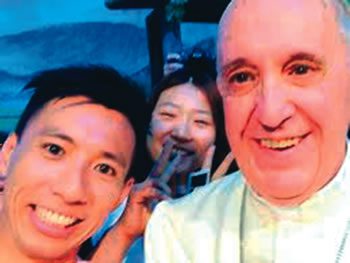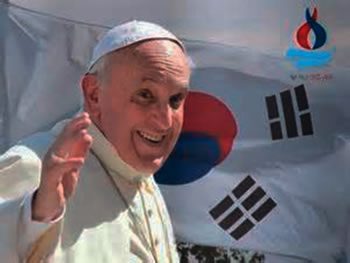Pope’s Visit to South Korea
 The Charismatic Pope
The Charismatic Pope
By Fr Emmanuel Kermoal MEP
Although only 10% of the population of South Korea is Catholic, the Koreans welcomed the Pope with great simplicity, enthusiasm and respect.
In France. a strongly secular country*, it is not always easy to speak about religion in “the public square,” and the visit of a religious leader can arouse questions from pernickety defenders of secularism. Korea also practises the separation of political and religious powers, but there is no anticlericalism, and the notion of laicity is not very much known. In their relations with religion the Koreans do not seem to be tense, on their guard, as many French people often seem to be. Certain people, like the anticlericals, are sometimes hostile to religions.
This attitude is hard to find in Korea. In the forty years I have been in Korea, often among non-christians, I have never been threatened, mocked or scorned because I was a Christian or a priest. That explains, a little, I think, why the Koreans as a whole, have given the Pope a warm welcome, full of sympathy and respect. Here is what a political commentator wrote in the newspaper, the “Korea Times”about the papal visit.
“On 14th August I saw Pope Francis go by while I was waiting to cross the street to go to my office at Soedaemun. He was coming from Cheong wa dae (the presidential palace) to meet a group of Catholic priests at Junggokdong (office of the Bishops’ Conference) in the east of Seoul. I wasn’t able to catch his eye, because he passed so quickly, but I could see the Pope smiling, dressed in white, and greeting the joyful crowd. I waved to him energetically. At that moment, I experienced a feeling of joy, as if I had received the Pope’s energy. I believe that the Pope’s visit has been the occasion of greater joy for those who have seen him face to face ,shaken his hand, or those who have been embraced or blessed by him. We Koreans have been happy to have had him with us for 100 hours.” This impression of a journalist, probably not a Catholic, reflects pretty faithfully the feelings of the Koreans. So why were they so happy to have had the Pope among them for 100 hours?
A stone in the Korean clergy’s garden
Those 100 hours were well filled. Pope Francis, as soon as he arrived at the airport, surprised the Koreans by being swept into a little Korean car, a little Kia. In a country where everyone likes to have a fine large car, that caused a shock. How was a leader on the world stage able to use such a small vehicle? But this papal gesture also had an impact in the Korean Church. The Sister-Superior of the Holy Family hospital, where I celebrate Mass, told me “That’s a real blow for the Korean priests who love so much getting round in their big cars.”Quite casually, by gestures like that, Francis knew how to remind people of their responsibilities. And without saying a word.
Concern for the poor and the little people.
There were other impressive moments on this journey. Before the Mass for the beatification of the 124 martyrs, the Pope had his car stop in front of a group of relatives of the victims of the “Sewol” (the ferry that sank off the west coast of Korea on 14th April 2014, drowning 304 people, mainly school pupils on an educational trip) who were on a hunger-strike to force the government to tell the truth about the accident. He got out of the car, and went to greet them and console them. He also showed his concern for the poor and the little ones in meeting the “comfort women,” forced to accompany the Japanese army during the war in Asia (1931 – 45). At the “village of flowers” he met people with disabilities and other marginalised people. When he got to the airport, he also met people demonstrating against the construction of a naval base on Cheju, an island off the south coast of Korea. More than his speeches, these gestures of solidarity with the weakest people in society touched the hearts of the Koreans. This is what a 23 year old man told me: “Our country has been harmed by many accidents. It is wounded. That leaves us divided and torn apart. I hope that the Pope’s visit will teach us the love of Christ, will help us to overcome political struggles and that this visit will heal the wounds we see on each other, and that it will help us to prevent other tragedies in the future.”
He leaves us with things to do
The day the Pope left, a national newspaper, the “Kyonghyang Shinmun.” entitled its leading article: “The Pope goes away, leaving us things to do.” That pretty well sums up the feelings of Koreans about this visit. They didn’t expect the Pope to solve their problems for them, but they welcomed and appreciated the message which the Pope wanted to share with them: to give priority to the human, to the person, and do that by paying attention to the poorest and weakest in society. This message was also addressed to the Church in Korea. If he beatified the Korean martyrs, if he praised Korean lay-people, Pope Francis did not praise the Church of Korea, nevertheless a prosperous Church, with many baptisms, many religious vocations. But he warned it against temptations to materialism, power, self-sufficiency, and forgetfulness of the poor.
Let us leave the last word to the auxiliary bishop of Seoul, Bishop Peter Chung Soon Taek: “The Pope has brought a new breath into the Korean Church, and now we have a consensus which will allow us to change as the Pope requires. He has said that the clergy must be humble, and not hypocritical. This was the Pope’s view, so his words are persuasive for us.”
And we missionaries in Korea, whether we have been here for sixty, fifty, forty years, or six months, we were also happy to have spent these hours with Pope Francis...very often in front of the TV set.
(In “Missions Etrangeres de Paris” No 501 January 2015)
* secular . An attitude which denies any validity to religious views in deciding policies to be followed.
Translated by Fr Brian Quin sm
 Entries(RSS)
Entries(RSS)